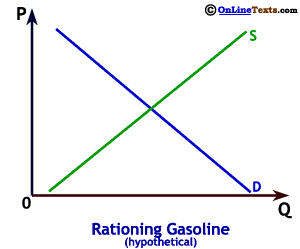
Governments sometimes use rationing in an attempt to control the total quantity of a good that is consumed. Rationing sometimes arises in countries involved in war to assure that goods, like gasoline, are available for military purposes. Thus civilian use of such goods may be rationed.
The problem with rationing is evident on the graph to the right. In this hypothetical market, the equilibrium price of gasoline is $3.00 and the equilibrium quantity is 50. If the rationed quantity is 20 gallons per person, the price will rise to $4.50 because this is the willingness to pay when the per person quantity is limited to 20 gallons. At a price of $4.50, however, producers would like to supply 75 gallons per person. As in the case with price ceilings, the incentive for illegal markets to arise is powerful. Rationing makes the good relatively scarce, driving up the market price and inducing sellers to sell additional quantities illegally to capture additional profit. Strict law enforcement is necessary to keep these incentives from thwarting the intended policy of trying to reduce consumption of the rationed good.

